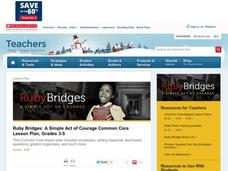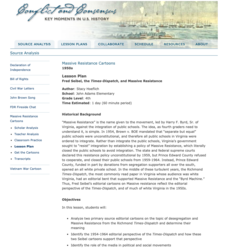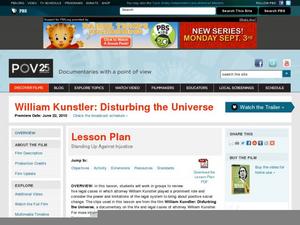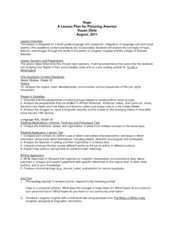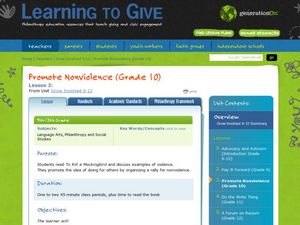National Endowment for the Humanities
The Freedom Riders and the Popular Music of the Civil Rights Movement
The Civil Rights Movement of the 1960s marched to its own beat—literally. Using songs from the era, as well as other primary sources such as King's "I Have a Dream" speech, class members analyze lyrics to discover how music and protest...
Alabama Department of Archives and History
Women of the Movement: Civil Rights Movement in Alabama
Many know of Rosa Parks involvement in the Civil Rights Movement, but who were other female leaders? The lesson focuses on female Civil Rights leaders and their achievements. Scholars complete research, participate in group discussions,...
National Endowment for the Humanities
Martin Luther King, Jr. and Nonviolent Resistance
Was nonviolent resistance the best means of securing civil rights for black Americans in the 1960s? In this highly engaging and informative lesson, your young historians will closely analyze several key documents from the civil rights...
Scholastic
Ruby Bridges: A Simple Act of Courage, Grades K-2
A civil rights movement lesson designed specifically with the Common Core State Standards in mind, young learners are introduced to the story of Ruby Bridges as the first African American child to attend an all-white elementary...
Scholastic
Ruby Bridges: A Simple Act of Courage, Grades 3-5
Through character trait graphic organizers, a vocabulary sorting activity, class discussion, and a civil rights movement slide show, your young historians will be introduced to the amazing story of Ruby Bridges and her experiences as the...
K20 LEARN
Analyzing The "I Have A Dream" Speech
The famous words of Martin Luther King still resonate with scholars today. An enlightening lesson helps pupils examine the "I Have a Dream" speech in more depth and learn what impact it had on the civil rights movement. Young historians...
Curated OER
Adding to the Picture: The 1963 March on Washington
Who do your scholars imagine when they think about the civil rights movement? If only a few faces come to mind, this lesson will expand their concepts of the movement's leaders. Learners examine an image of the 1963 March on Washington,...
Roy Rosenzweig Center for History and New Media
Reconstruction
When slavery ended, what did the government do to help African American during Reconstruction? An interesting instructional activity uses primary sources such as newspaper articles to help scholars analyze Reconstruction policies and how...
EngageNY
Building Background Knowledge: Why Do Workers Strike? (Chapter 11: "Los Aguacates/Avocados")
Make connections between Esperanza Rising and human rights with the activities outlined here. The instructional activity starts out with a brief quiz and review of the novel. After that, pupils circulate and share quote strips that you...
Roy Rosenzweig Center for History and New Media
Fred Seibel, the Times-Dispatch, and Massive Resistance
A lesson challenges scholars to analyze editorial cartoons created by Fred Seibel, illustrator for the Times-Dispatch, during the Massive Resistance. A class discussion looking at today's editorial pages and Jim Crow Laws leads the...
PBS
Standing Up Against Injustice
“Sometimes things are lawful yet are actually wrong.” Researchers examine primary and secondary source materials as they study five legal cases involving civil rights attorney William Kunstler in which he attempted to use the legal...
Maryland Department of Education
Our Children Can Soar
Amazing efforts of African American leaders are celebrated in a instructional activity on civil participation. The engaging resource focuses on primary and secondary sources to analyze the impact of African American leaders such as Ella...
National Endowment for the Humanities
Revolution '67, Lesson 1: Protest: Why and How
To some people, protesting is as American as apple pie, but the factors that lead to protests can be as confusing to veteran activists as to today's youth. Revolution '67 explores the riots in Newark, New Jersey as a case study. ...
Curated OER
Picturing America: Images and Words of Hope from Romare Bearden and Langston Hughes
A carefully crafted three-day lesson integrates poetry and visual art. By analyzing and comparing Langston Hughes' poem "Mother and Son" and Romare Bearden's collage "The Dove," readers explore the theme of hope. The lesson activates...
Teaching Tolerance
The War on Drugs—Mechanisms and Effects
The war on drugs doesn't have definite results. An interesting lesson examines the social, political, and economic effect of the war on drugs. Academics learn how the war on drugs has led to mass incarcerations and negatively affected...
US Institute of Peace
Governance, Corruption and Conflict Simulation on Nepal
Can your class help the people of Nepal? Scholars take an in-depth look into the social injustices and struggling economy of a country in turmoil during a multi-day role-playing exercise. After reviewing information on the problems...
Curated OER
Promote Nonviolence
Take a look at the topic of violence as seen in Harper Lee's To Kill a Mockingbird. Discuss together the values that Atticus holds and brainstorm ways to combat violence in a similar manner to what he portrays in the novel. Get your...
Curated OER
Create a Magic Lantern Show; Freed People in the Reconstruction South
Engage your scholars by having them create "magic lantern shows" inspired by the film Dr. Toer's Amazing Magic Lantern Show: A Different View of Emancipation. As they study the South's Reconstruction through primary...
Smithsonian Institution
Black Diamond
Score a home run with this packet of information on the very first player of the Negro League to be elected into the National Baseball Hall of Fame — cultural groundbreaker and sports legend Satchel Paige. These worksheets include a...




